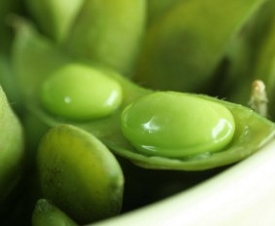On a road trip to Kansas City, MO in the spring of 1999, Dr. Kelley shared with me his insight on diet. “If you take an Eskimo”, he stated, “and ship him off to Japan for a year and place him on a healthy Japanese diet including soy, he’ll be dead before the year is over. If you send a Japanese person to Alaska, he’ll die of the fatty diet served there.”
The problem in the U.S. is, that if we are told that something is good for us – we’ll overdose on it, believing that it will REALLY be good for us. All in moderation my son… all in moderation. (Ed.)
 As time goes by, people are steadily waking up to some of the proven facts about soy, such as the knowledge that most soy is GMO. If that is the case, one can deduce that to solve the problem one can simply buy organic soy products. While it’s true that organic soy is healthier for you than GMO soy, there are other facts about soy that pose serious health risks. Here are four facts that debunk soy as a healthy food choice.
As time goes by, people are steadily waking up to some of the proven facts about soy, such as the knowledge that most soy is GMO. If that is the case, one can deduce that to solve the problem one can simply buy organic soy products. While it’s true that organic soy is healthier for you than GMO soy, there are other facts about soy that pose serious health risks. Here are four facts that debunk soy as a healthy food choice.
Four reasons to phase-out most soy products on the market
1. Soybeans contain large amounts of toxins. Unlike with other foods where any toxins are destroyed or deactivated during cooking, the toxins in soybeans remain intact. Some of these toxins, or “enzyme inhibitors,” block the actions of enzymes needed for the digestion of protein. The enzyme inhibitors in soy are linked to cancer in lab animal tests. Test animals fed enzyme inhibitors developed enlargement and pathological conditions of the pancreas, including pancreatic cancer.
2. Soybeans can interfere with nutrient absorption during digestion. This is because soy is high in phytic acid, which has been shown to block absorption of minerals calcium, magnesium, copper, iron and zinc.
3. Soybeans are among the most highly pesticide-contaminated foods on the market. As you probably know, pesticides are a toxic, distorted-energy-spin substance, linked to a variety of ailments. Soy products also contain high levels of aluminum, a life-force sapping heavy metal which does not belong in foods that we put in our bodies, as it has bio-accumulative negative health effects. The aluminum in soy comes from the aluminum tanks in which the beans are acid washed and heat-processed.
4. Soybeans contain haemagglutinin, nitrites, soy protein isolates, and goitrogens. Each of these substances has a particular negative effect on your health. Haemagglutinin is a blood clot-promoting substance which causes red blood cells to clump together. Nitrites are powerful carcinogens which form when soybeans are spray-dried (carcinogens are potential cancer-causing agents). Soy protein isolates have been shown to enlarge the pancreas and thyroid gland and also increase fatty acid deposits in the liver. Goitrogens are found in soy-based foods in large amounts. They block thyroid hormone production. All of the above substances have the effect of disrupting body chemistry and hormones.
Wait a minute! I thought soy was good for me
Like me, you’ve probably been under the impression that soy was healthy for years. In which case, the truth turns out to be shocking as it was to me. And still, proponents of soy will assert that Asian cultures have been safely eating soy for thousands of years. However, this has been debunked as only a partial truth. Asians began eating soybeans 2,500 years ago only after figuring out how to ferment it. Ancient Asian cultures knew that soybeans contain multiple toxic substances even after cooking. It is only through the process of fermentation that toxins in soy are safely neutralized.
Soy: Healthy in the right form
The distorted half-truth about soy having beneficial, health-enhancing properties is actually based on fact. The truth however, is that the beneficial properties of soy are only made available during fermentation when a special mold grows on the beans. Fermentation has the dual purpose of making the nutrients in soy bio-available, while simultaneously destroying the toxins.
Fermented soy products include tempeh, miso, and natto. As for tofu, the toxic enzyme inhibitors live in the soaking liquid around the tofu, not the tofu curd itself. Thus, the toxins in tofu are reduced in quantity but not eliminated.
Written by Zach C. Miller for Natural News, and published on July 16, 2013.
FAIR USE NOTICE: This site contains copyrighted material the use of which has not always been specifically authorized by the copyright owner. We are making such material available in our efforts to advance understanding of environmental, political, human rights, economic, democracy, scientific, and social justice issues, etc. We believe this constitutes a ‘fair use’ of any such copyrighted material as provided for in section 107 of the US Copyright Law. In accordance with Title 17 U. S. C. Section 107, the material on this site is distributed without profit to those who have expressed a prior interest in receiving the included information for research and educational purposes. For more information go to: http://www. law. cornell. edu/uscode/17/107. shtml
